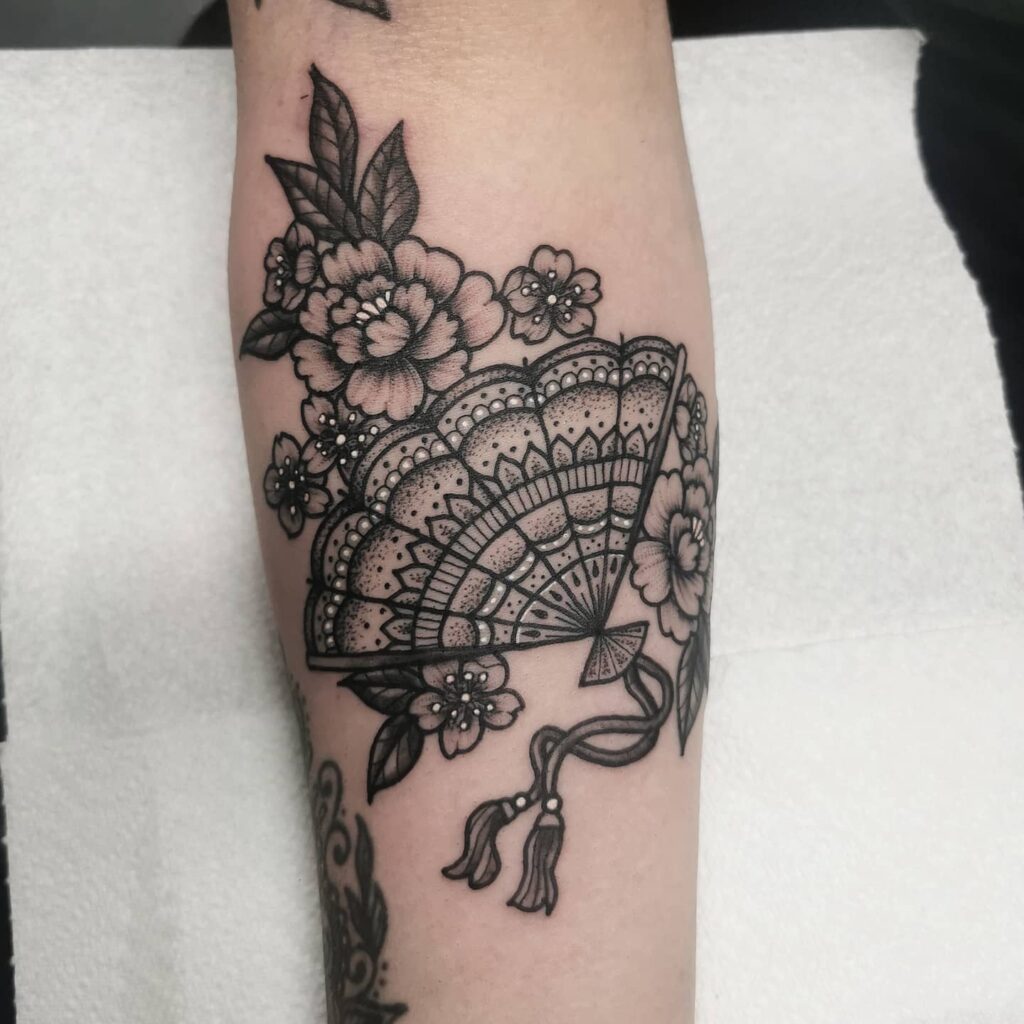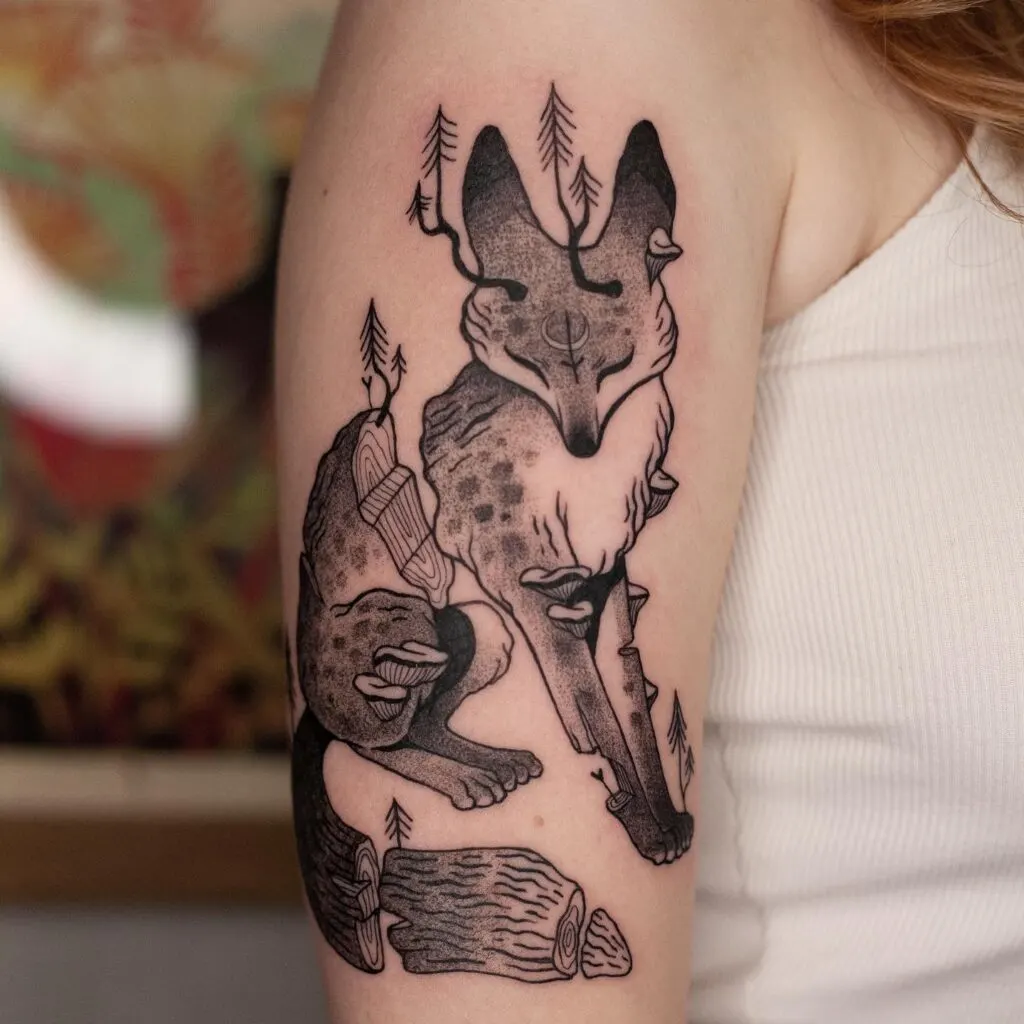1. Koi Fish
Koi fish are one of the most iconic Japanese tattoo designs, symbolizing perseverance, determination, and strength in the face of adversity. According to Japanese legend, koi fish swim upstream and eventually transform into dragons, representing transformation and personal growth. These tattoos are often vibrant, featuring bright oranges, reds, or blues, and the fish is depicted swimming upstream or downstream depending on the wearer’s story. A koi fish swimming upstream symbolizes a struggle that has yet to be overcome, while one swimming downstream suggests the wearer has already triumphed over adversity. The koi fish can be combined with water elements or lotus flowers for added symbolism of purity and beauty.
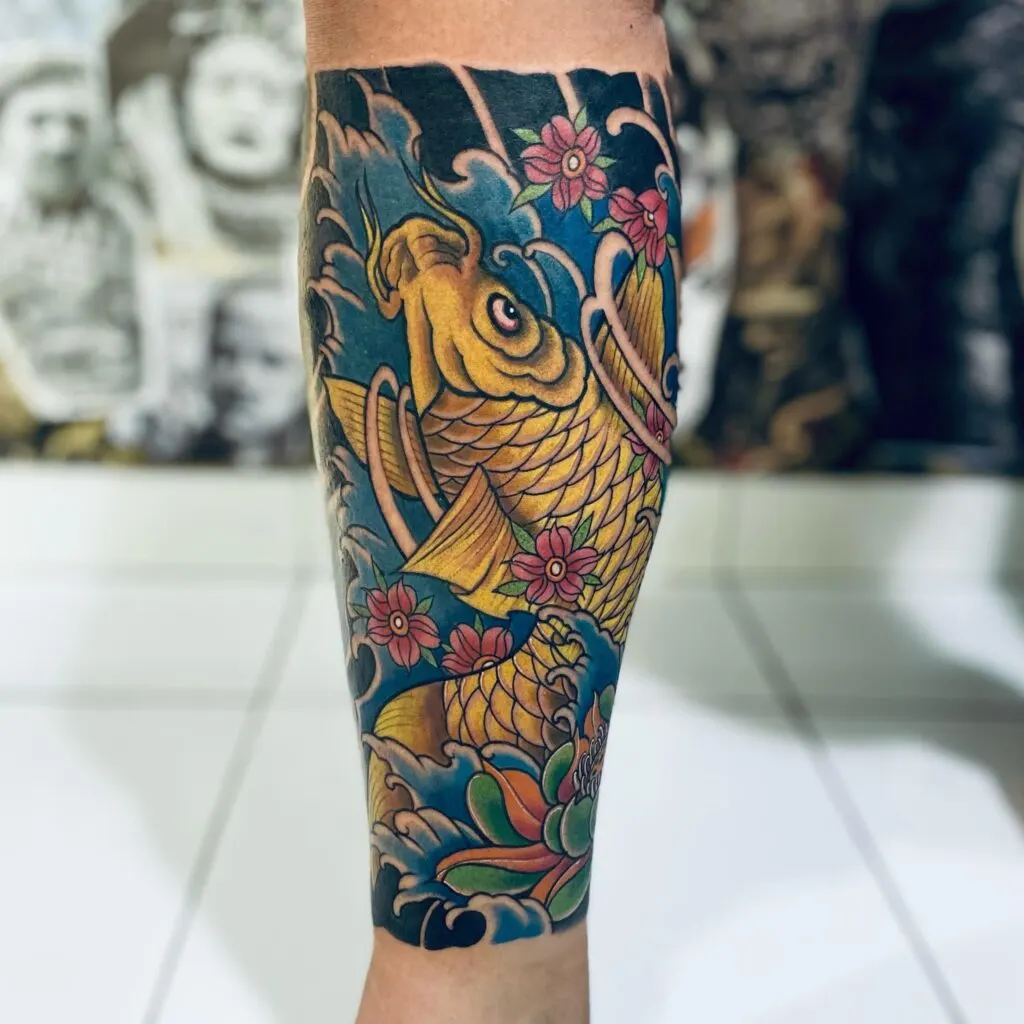
2. Dragon
Dragons in Japanese culture symbolize wisdom, strength, and protection, and are commonly associated with the power of water and the heavens. A dragon tattoo represents a guardian figure that protects the wearer, embodying strength, courage, and the ability to overcome challenges. Unlike Western depictions of dragons as fire-breathing creatures, Japanese dragons are often seen as benevolent and wise. The design typically features intricate scales, flowing bodies, and fierce expressions, making the tattoo both visually stunning and deeply meaningful. Dragons are often tattooed in full sleeves or large back pieces to fully capture their majestic form and power.
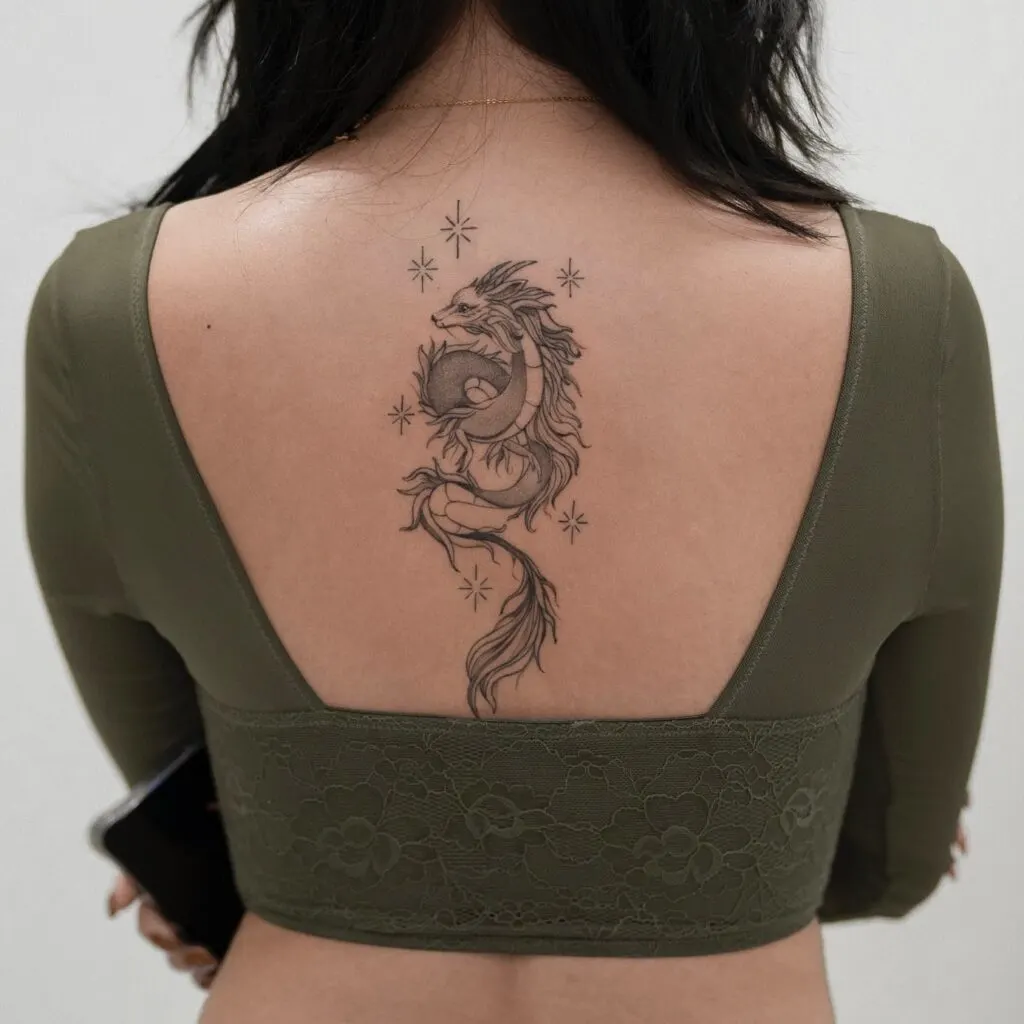
3. Cherry Blossom (Sakura)
Cherry blossoms, or sakura, represent the fleeting nature of life in Japanese culture. These beautiful flowers bloom for a short time in the spring before falling away, symbolizing the transience of life and the importance of appreciating its beauty. A cherry blossom tattoo serves as a reminder to live in the moment and cherish each experience. These tattoos are often designed in delicate pink hues and can be combined with other elements like water or wind for a more dynamic look. Cherry blossom tattoos are perfect for those seeking to convey the beauty of impermanence and the cycle of life.
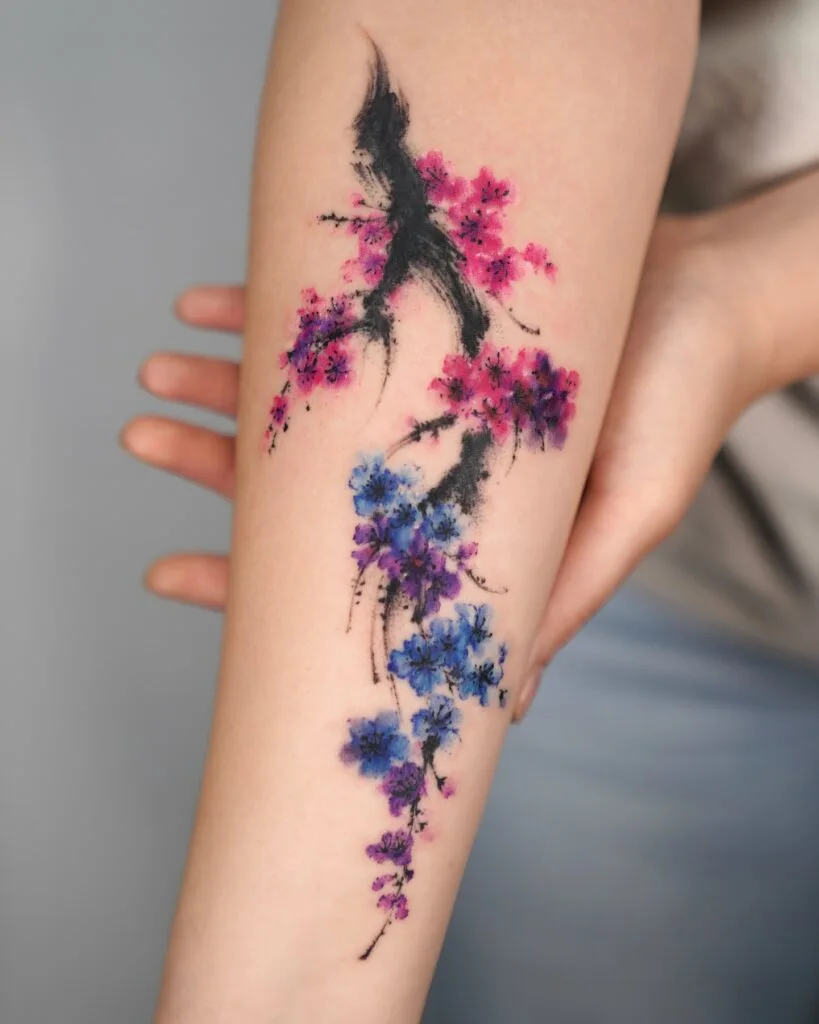
4. Hannya Mask
The Hannya mask is a powerful symbol in Japanese folklore, representing a vengeful female spirit transformed by jealousy and rage. In tattoos, the Hannya mask can symbolize both anger and protection, with the wearer acknowledging the duality of human emotions. The mask features a fierce expression, sharp teeth, and horns, making it a visually striking design. Despite its fearsome appearance, the Hannya mask can also represent wisdom gained through hardship. Tattoo designs often incorporate traditional Japanese elements like flowers or waves, and the mask can be depicted in a variety of colors, with red symbolizing deep rage and white representing more subtle emotions.
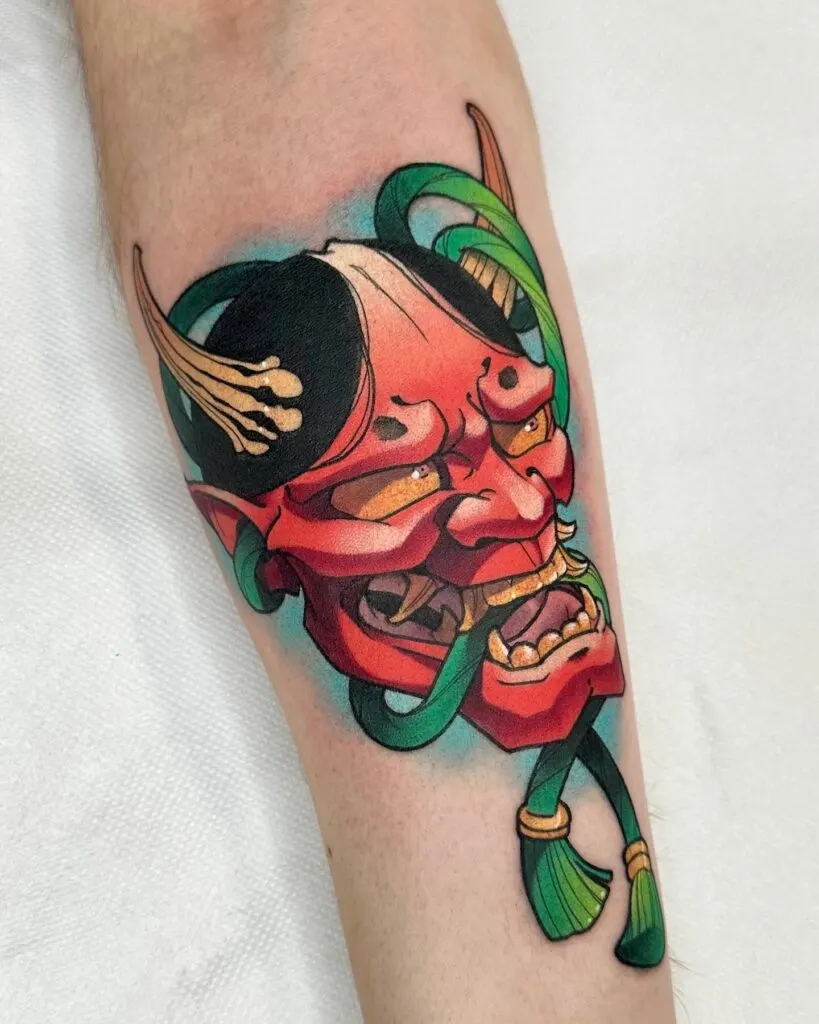
5. Samurai
Samurai tattoos represent honor, loyalty, and discipline, reflecting the values upheld by these ancient Japanese warriors. As symbols of bravery and strength, samurai tattoos often feature warriors in traditional armor, holding katanas, and depicted in action poses. The samurai embodies the code of Bushido, which emphasizes courage, respect, and integrity, making this tattoo a popular choice for individuals who value these traits. Samurai tattoos are typically designed with intricate details, including armor, swords, and facial expressions. They are often incorporated into larger designs, featuring traditional Japanese elements like cherry blossoms, waves, or dragons, adding deeper meaning to the tattoo.
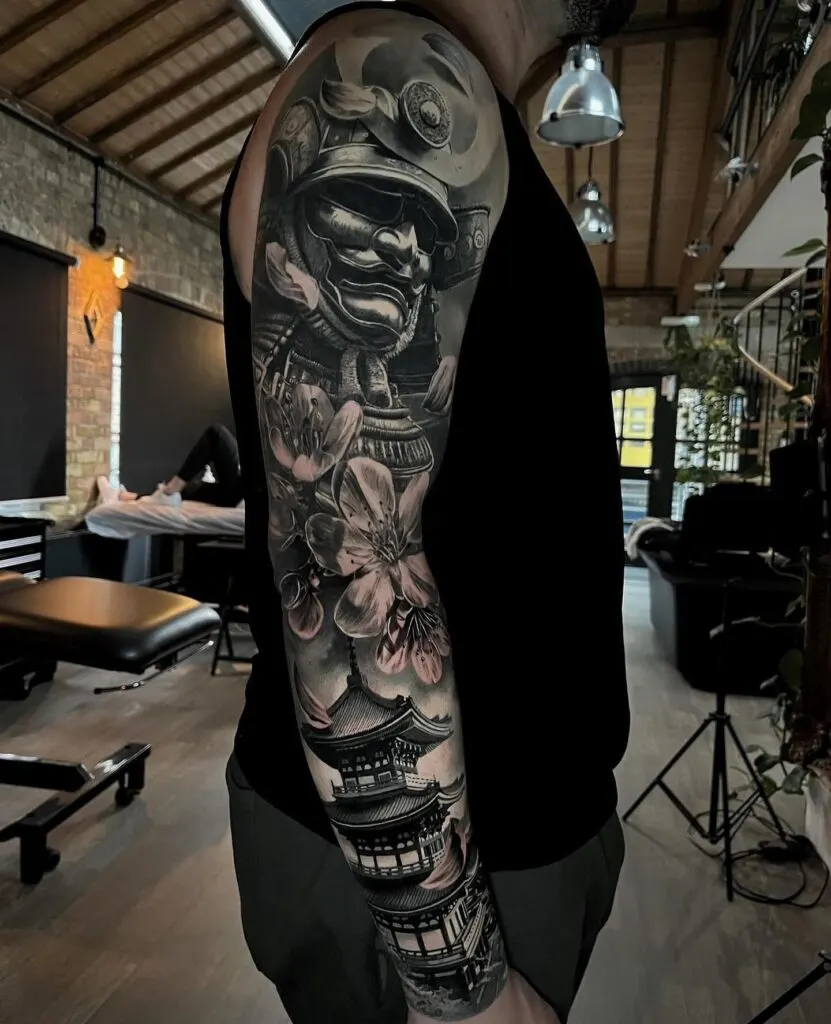
6. Phoenix (Hou-ou)
In Japanese mythology, the phoenix, known as Hou-ou, symbolizes rebirth, immortality, and renewal. The bird is often associated with fire, as it is said to rise from its ashes after being consumed by flames. A phoenix tattoo represents resilience, transformation, and new beginnings, making it a meaningful choice for those who have overcome challenges or are embarking on a new chapter in life. The phoenix is typically depicted with vibrant red, orange, and yellow flames, with intricate feathers and a majestic posture. This tattoo is often designed as a large piece, spreading across the back or chest to emphasize its grandeur and significance.
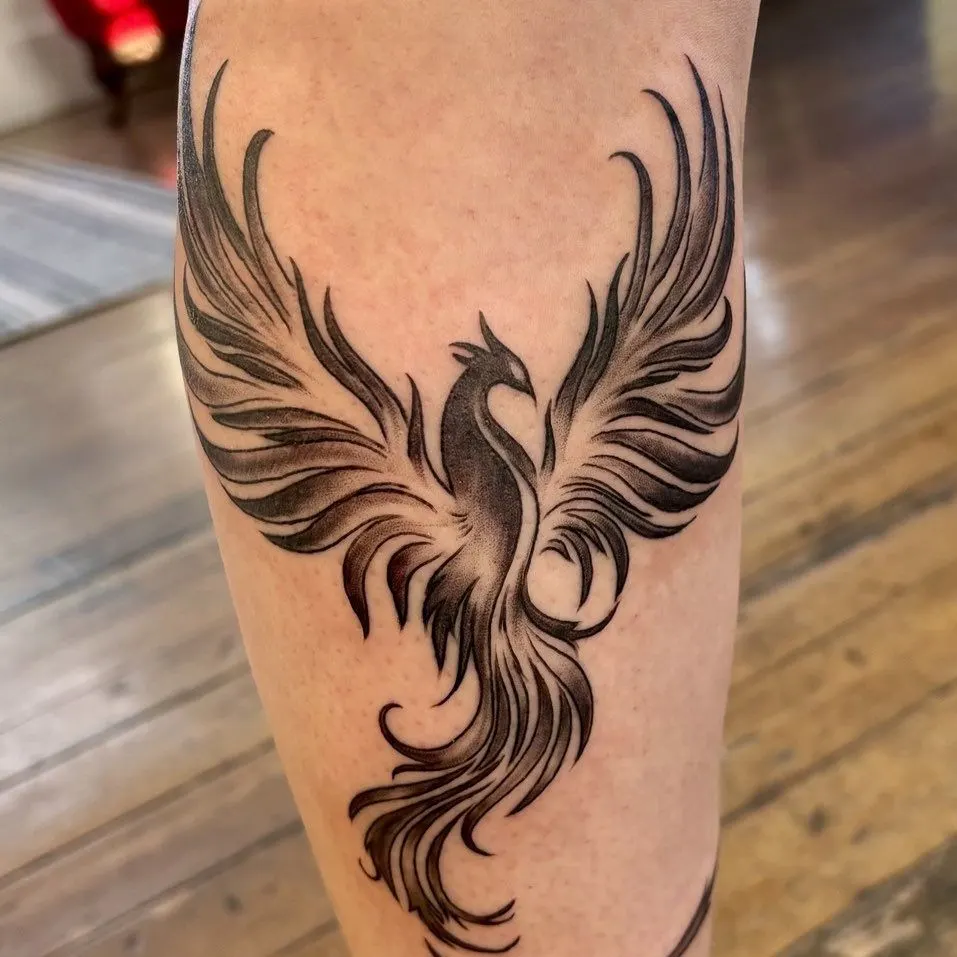
7. Geisha
Geisha tattoos represent beauty, grace, and the art of performance, reflecting the elegance and mystery of these traditional Japanese entertainers. Geisha are symbols of refined femininity, embodying the ideals of discipline, skill, and dedication to the arts. A geisha tattoo often features a woman dressed in a colorful kimono, holding a fan or parasol, with intricate detailing in her hairstyle and makeup. This tattoo can symbolize cultural appreciation, the pursuit of artistic mastery, or the celebration of inner beauty. Geisha tattoos are often paired with elements like cherry blossoms or fans to enhance their symbolism of grace and delicacy.
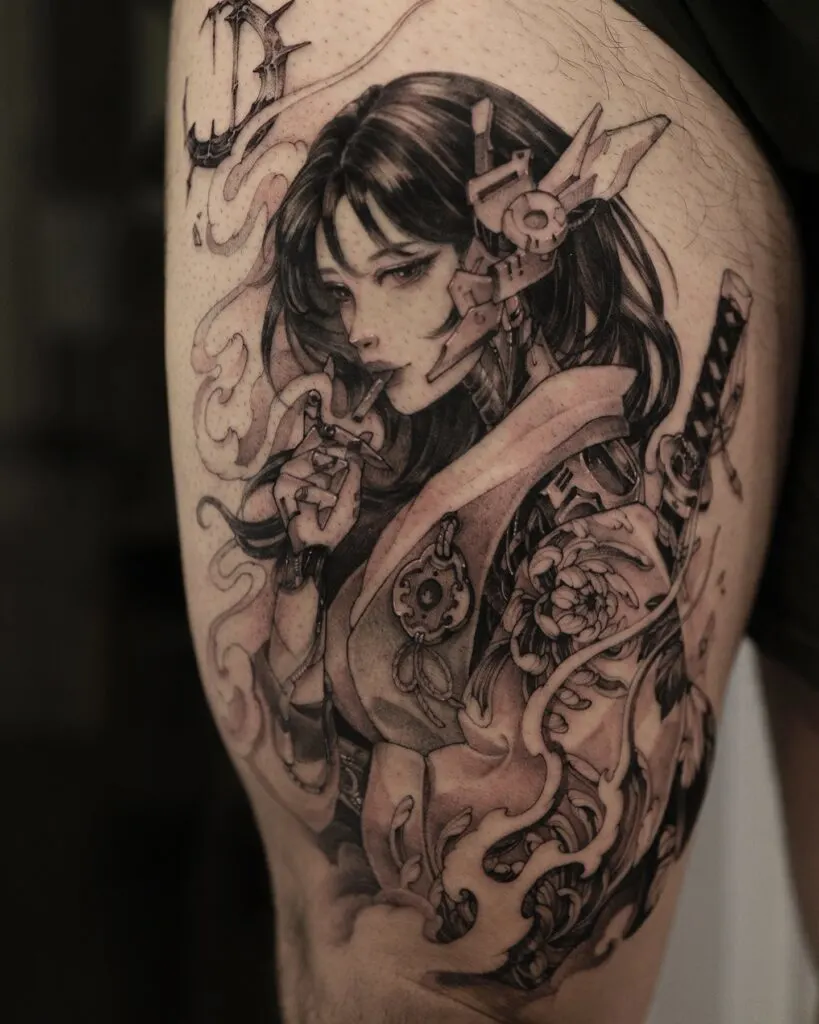
8. Tiger (Tora)
In Japanese tattoos, the tiger represents courage, strength, and protection, often seen as a guardian against evil spirits and bad fortune. Tigers are powerful creatures, and their presence in a tattoo can signify a strong and fearless personality. The design typically features a tiger in a dynamic pose, with bold stripes and fierce expressions. Tigers can be depicted alone or in combination with other elements like bamboo, waves, or clouds to emphasize their connection to nature and strength. A tiger tattoo is a popular choice for those seeking a bold, empowering symbol that conveys resilience and personal power.
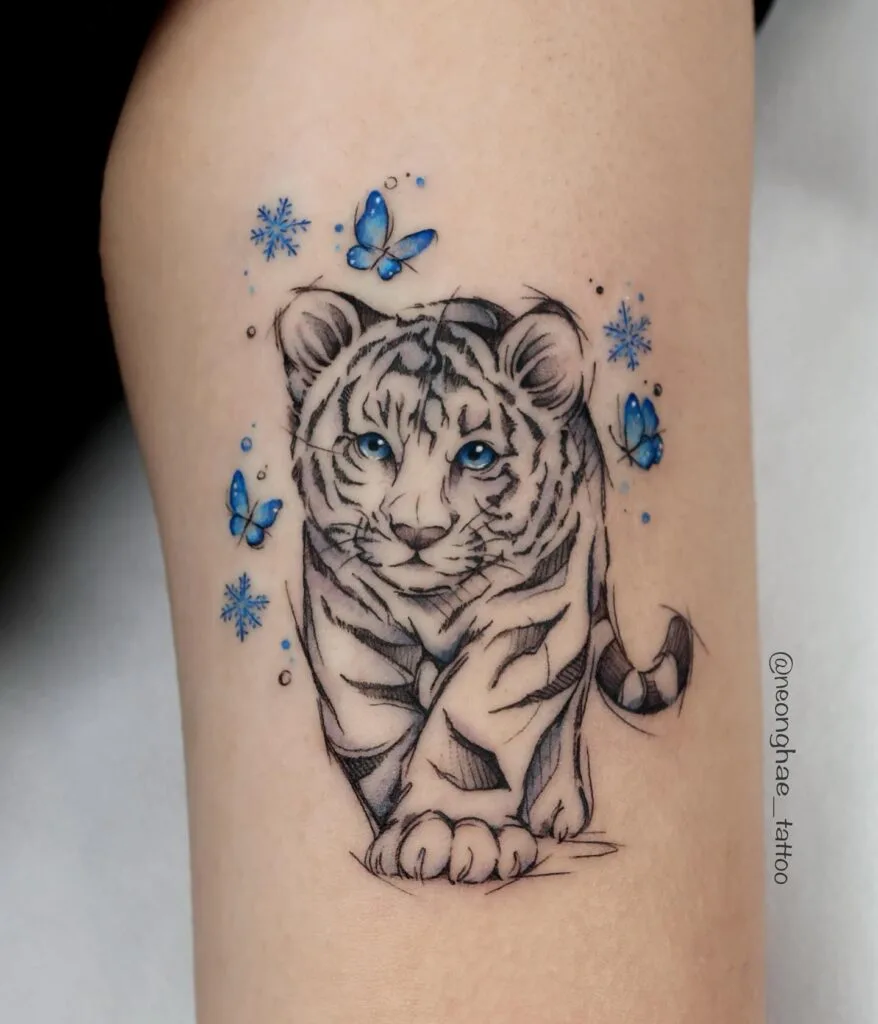
9. Lotus Flower
The lotus flower in Japanese tattoos represents purity, enlightenment, and the overcoming of adversity. Lotus flowers grow from the mud but bloom beautifully on the surface of the water, symbolizing spiritual growth and the ability to rise above challenges. In tattoo designs, the lotus is often depicted in vibrant colors like pink, white, or blue, with intricate detailing in the petals. The flower can be combined with water elements, koi fish, or other symbols of perseverance. A lotus tattoo is perfect for those seeking a symbol of inner peace, spiritual development, or personal transformation.
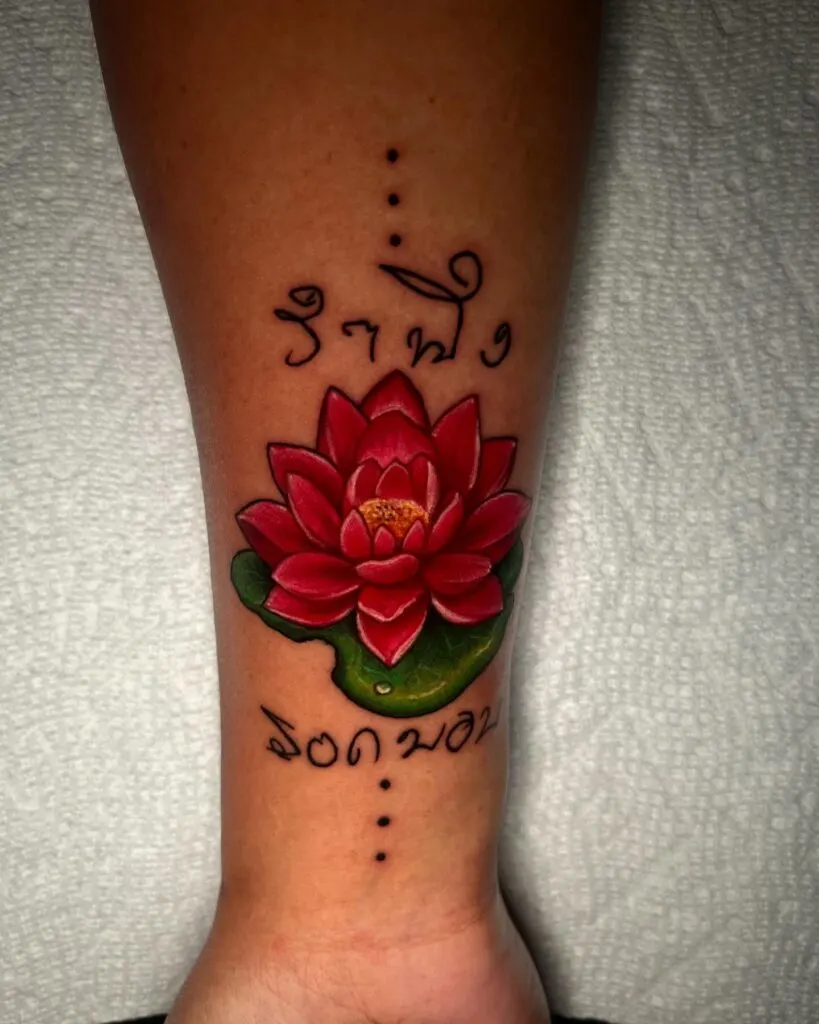
10. Oni Demon
Oni demons are fierce and powerful creatures in Japanese folklore, often depicted as guardians or punishers of evil deeds. In tattoos, Oni demons symbolize protection against evil spirits and bad luck, but they can also represent inner struggles or the duality of human nature. Oni tattoos typically feature a fearsome face with horns, sharp teeth, and a menacing expression. These designs are often bold, with deep reds and blacks used to enhance the intensity of the image. An Oni tattoo can serve as a reminder of personal strength and the ability to confront inner demons or external challenges.
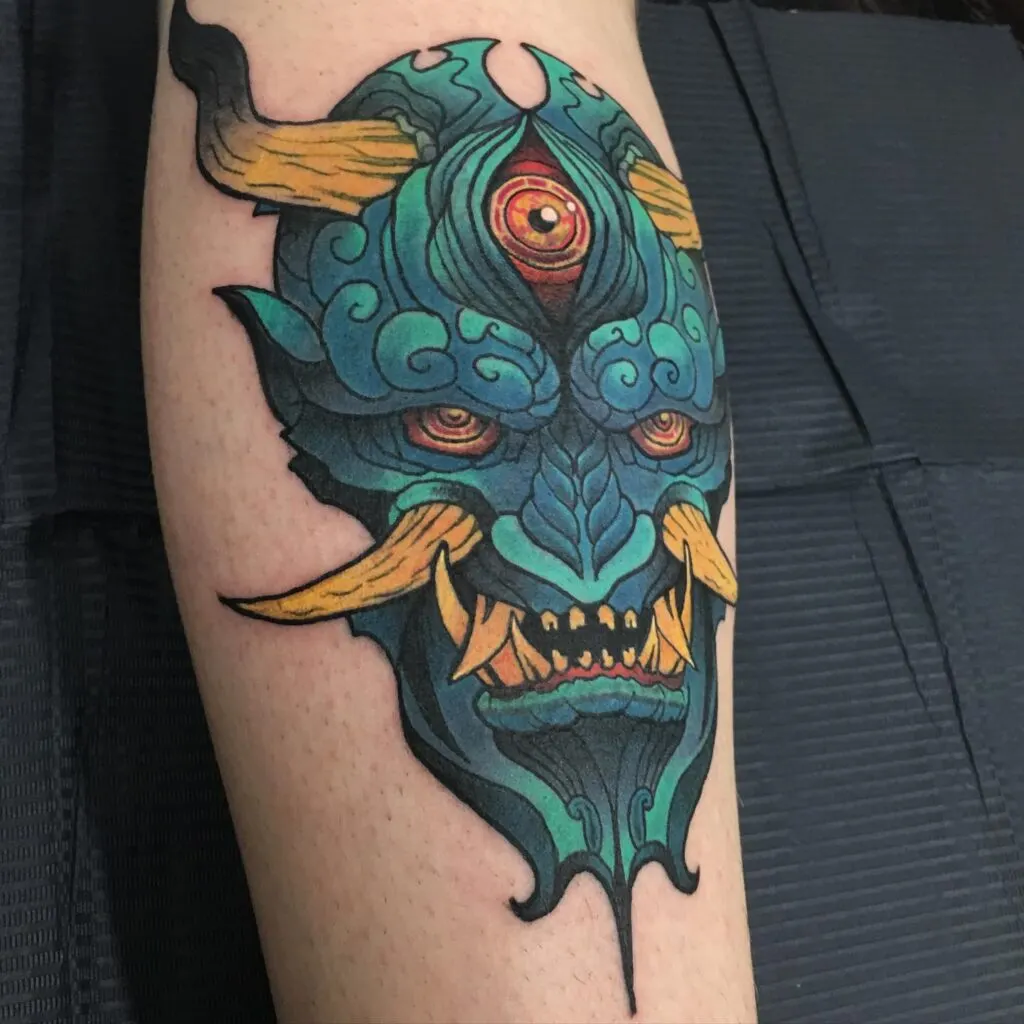
11. Crane (Tsuru)
The crane, or tsuru, is a symbol of longevity, good fortune, and peace in Japanese culture. It is often associated with hope and fidelity, as cranes are known to mate for life. In tattoos, the crane is usually depicted in elegant flight, with its long neck and graceful wings adding a sense of movement and serenity to the design. A crane tattoo can represent aspirations for a long and harmonious life or the desire for peace and tranquility. Cranes are often depicted with natural elements like water, clouds, or cherry blossoms to enhance their symbolic meanings.
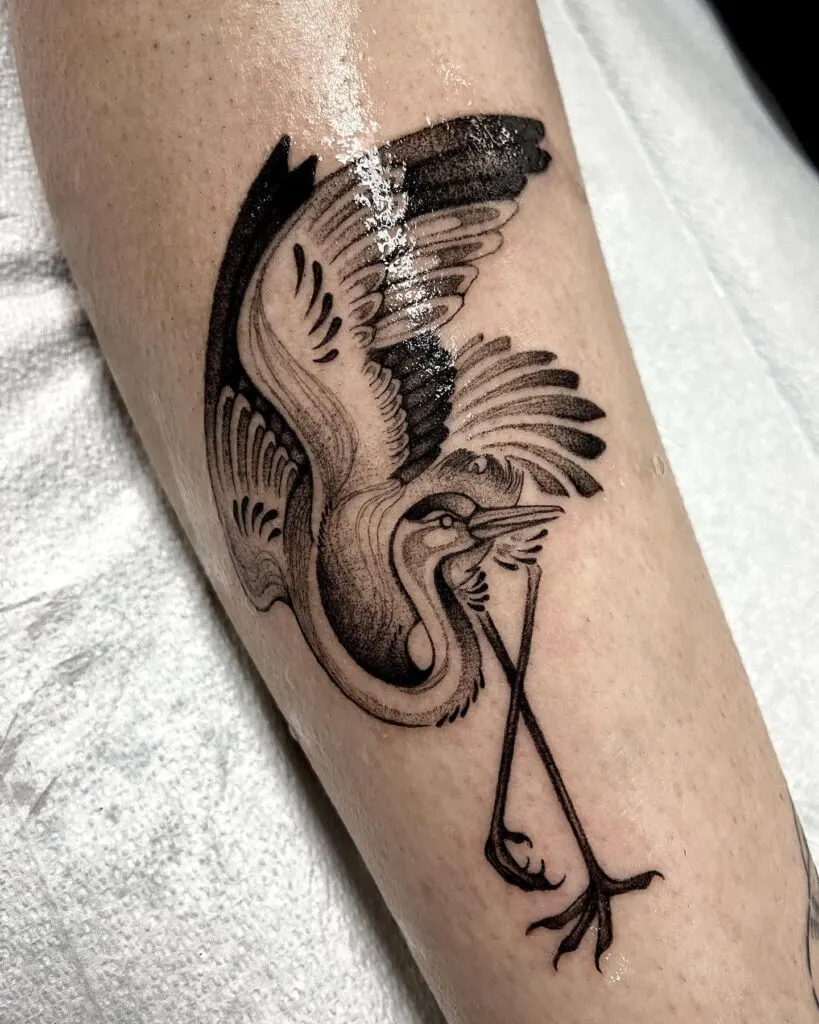
12. Snake (Hebi)
In Japanese tattoos, the snake, or hebi, symbolizes protection, wisdom, and transformation. Snakes are often associated with the shedding of skin, representing rebirth and the ability to adapt to change. A snake tattoo can serve as a protective symbol, warding off evil spirits and bad luck. Snake tattoos are typically designed with intricate scales, coiling bodies, and sharp eyes, often wrapped around other elements like flowers, swords, or skulls. These tattoos are popular for their dynamic and fluid designs, symbolizing personal growth, transformation, and the power to overcome adversity.
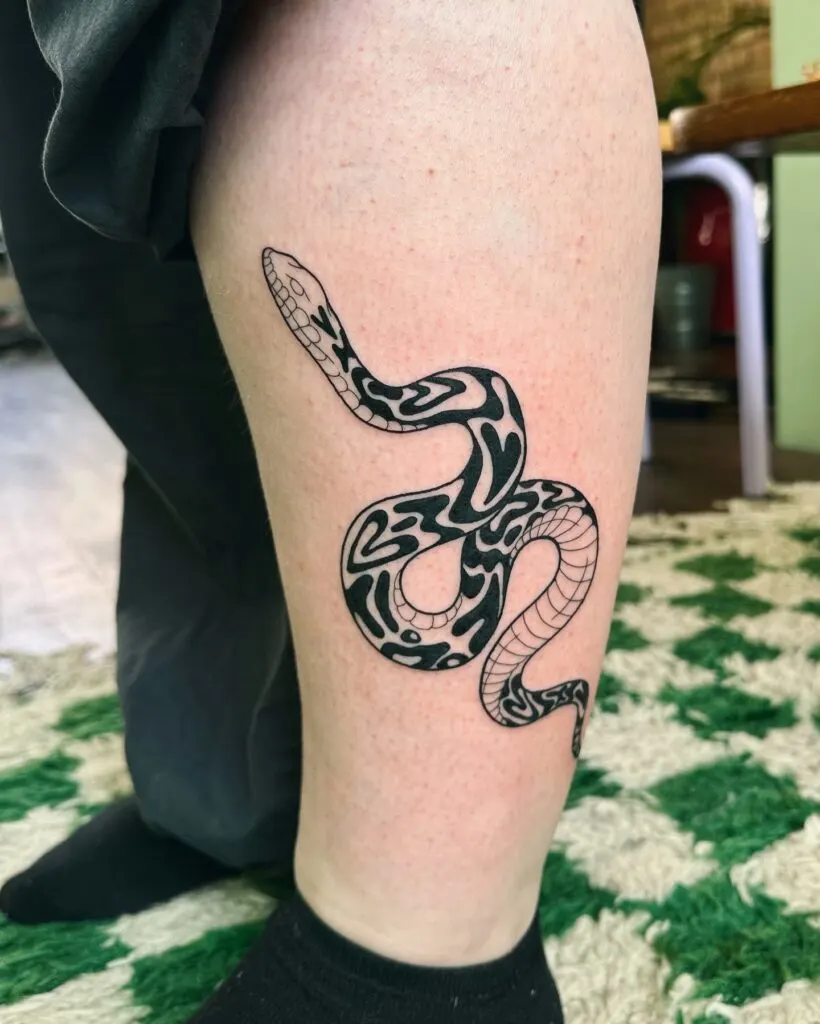
13. Waves (Nami)
Wave tattoos, or nami, are a staple of traditional Japanese tattoo art, symbolizing the powerful forces of nature and life’s constant ebb and flow. The wave is often depicted in a dramatic, stylized form, with sweeping lines and foamy crests. Wave tattoos can represent the challenges of life, resilience, and the ability to adapt to changing circumstances. They are often combined with other elements like koi fish, dragons, or cherry blossoms to enhance their symbolism. A wave tattoo is ideal for those who seek to express their connection to nature, the ocean, or the cycles of life.
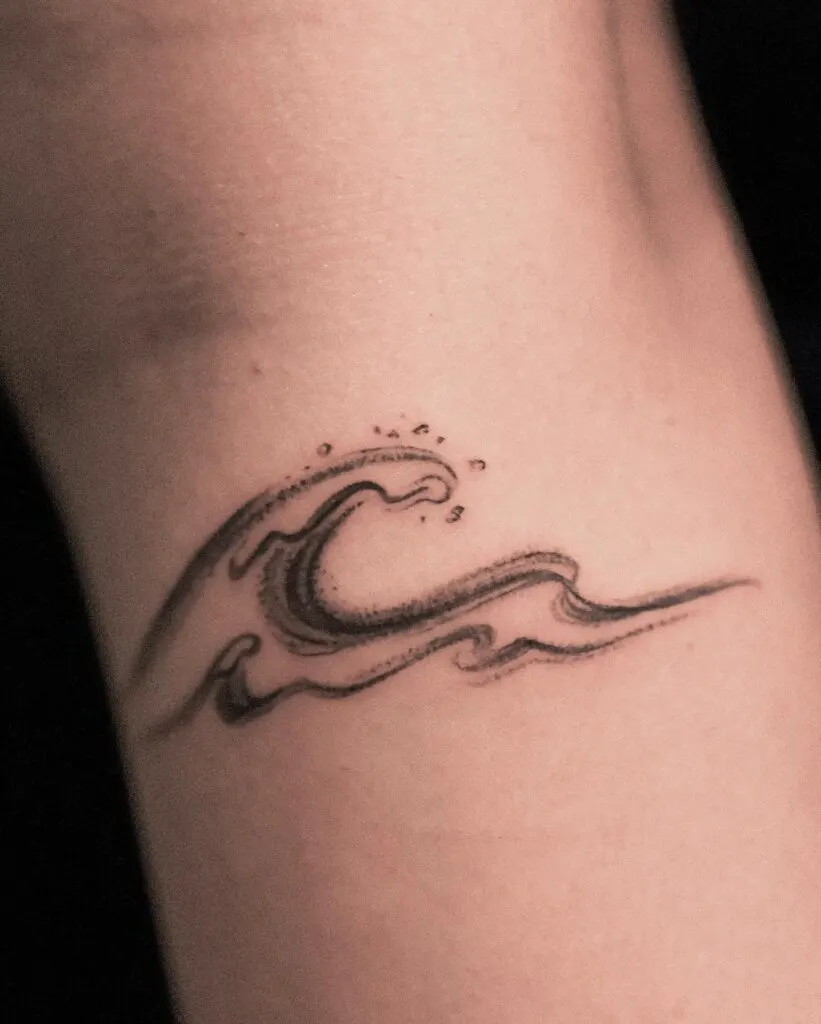
14. Daruma Doll
The Daruma doll is a traditional Japanese symbol of perseverance, resilience, and good luck. In tattoo designs, the Daruma is often depicted as a round, red figure with a determined expression and empty eyes, which are traditionally filled in once a goal is achieved. A Daruma tattoo can serve as a personal reminder to stay focused on one’s goals and never give up, no matter the obstacles. The design is often colorful and can include additional elements like Japanese kanji for good fortune. It’s a popular choice for those seeking motivation and encouragement in their personal or professional lives.
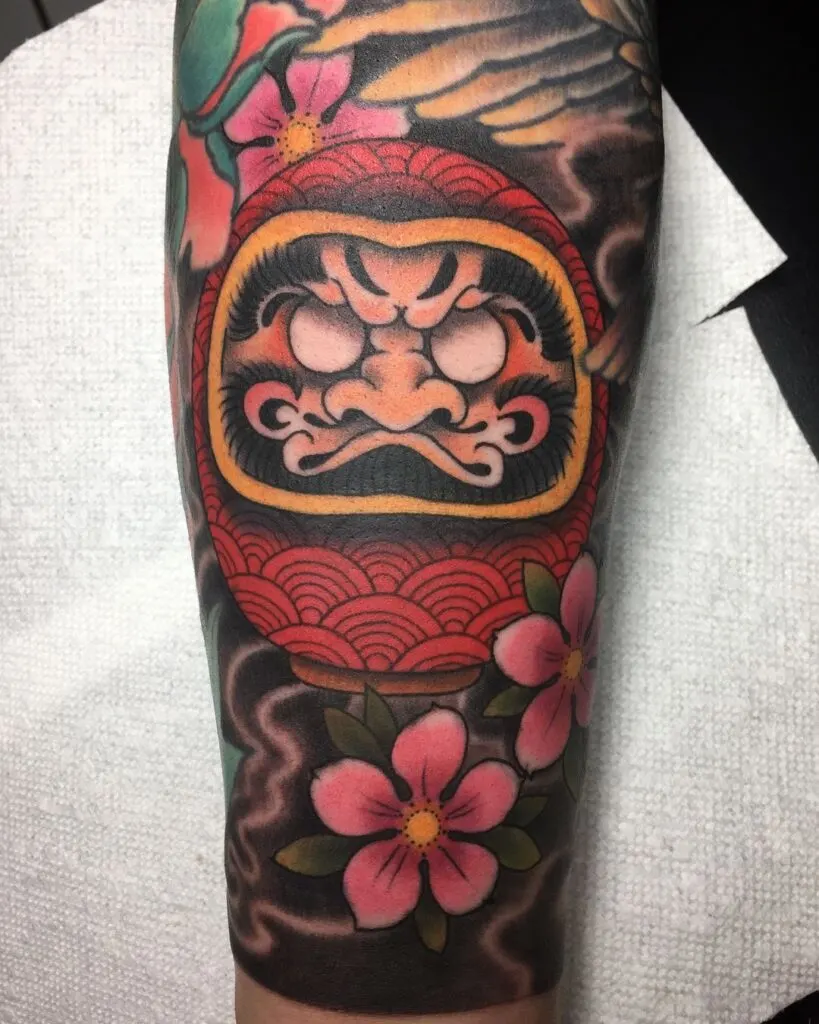
15. Peony (Botan)
The peony, or botan, is a popular motif in Japanese tattoo art, symbolizing wealth, prosperity, and honor. Known as the “king of flowers” in Japan, the peony is often used to represent strength and bravery, particularly in traditional Japanese irezumi (tattooing). Peony tattoos are often depicted in vibrant reds, pinks, or purples, with large, lush petals that convey a sense of beauty and nobility. These designs can be combined with other elements like dragons or tigers to enhance their meaning, making the peony tattoo both visually striking and deeply symbolic.
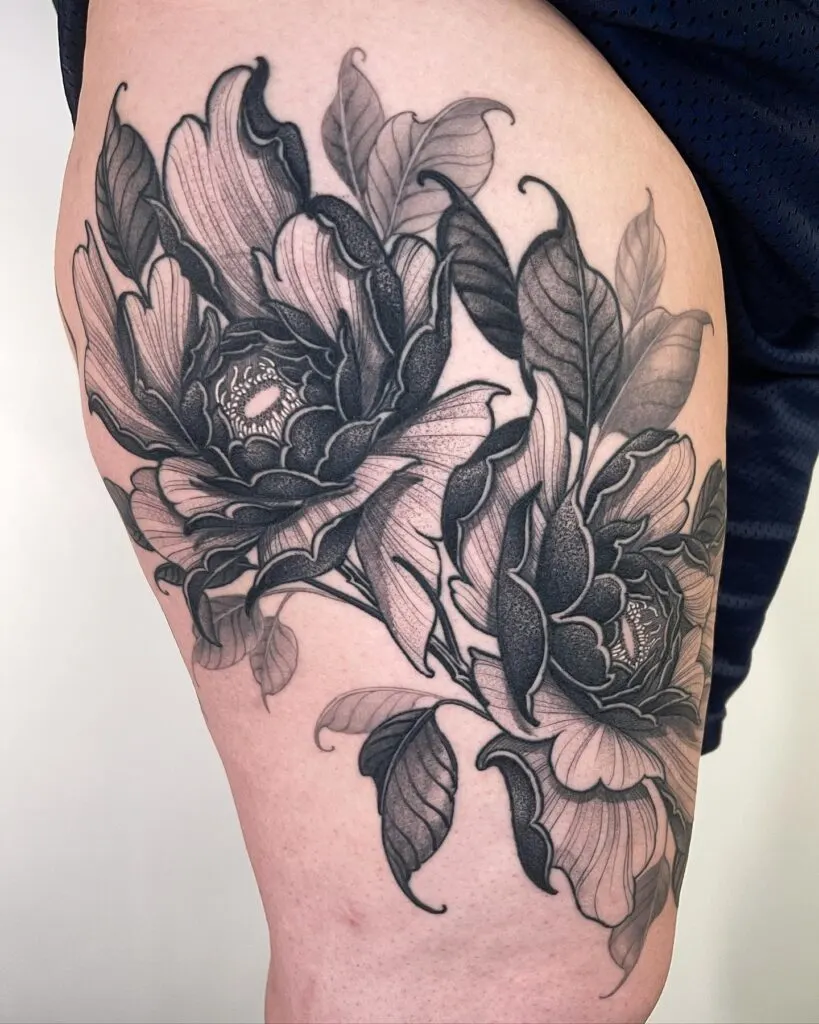
16. Kitsune (Fox)
The kitsune, or fox, is a mythical creature in Japanese folklore, known for its cunning, intelligence, and magical abilities. Kitsune tattoos often represent transformation, trickery, and protection. In some stories, the fox can shape-shift into human form, making it a symbol of adaptability and mystique. Kitsune tattoos are often designed with a mask-like face, sharp eyes, and flowing tails, sometimes with flames or mystical elements surrounding them. The fox is seen as a guide or protector, and this tattoo can symbolize the wearer’s ability to adapt to changing situations or outsmart obstacles in life.
17. Cherry Blossom with Water
Combining cherry blossoms with water in a tattoo design enhances the symbolism of life’s fleeting beauty and the flow of time. Water symbolizes change and the passage of life, while cherry blossoms represent the ephemeral nature of beauty and existence. Together, they create a powerful representation of impermanence and the need to appreciate the present moment. These tattoos are often designed with flowing water and delicate cherry blossom petals drifting along, creating a sense of movement and serenity. This combination is ideal for those seeking a reminder of life’s preciousness and the constant evolution of personal experiences.

18. Samurai Helmet (Kabuto)
A samurai helmet, or kabuto, symbolizes protection, strength, and honor in Japanese tattoos. The helmet is an iconic piece of samurai armor and represents the warrior spirit and commitment to the code of Bushido. Samurai helmet tattoos often feature intricate designs with crests, horns, and detailed armor patterns. This tattoo is ideal for individuals who identify with the values of discipline, loyalty, and courage, embodying the warrior’s mindset in their daily lives. The design can be combined with other symbols like swords or cherry blossoms to enhance its meaning, making it both a visually striking and symbolic piece.
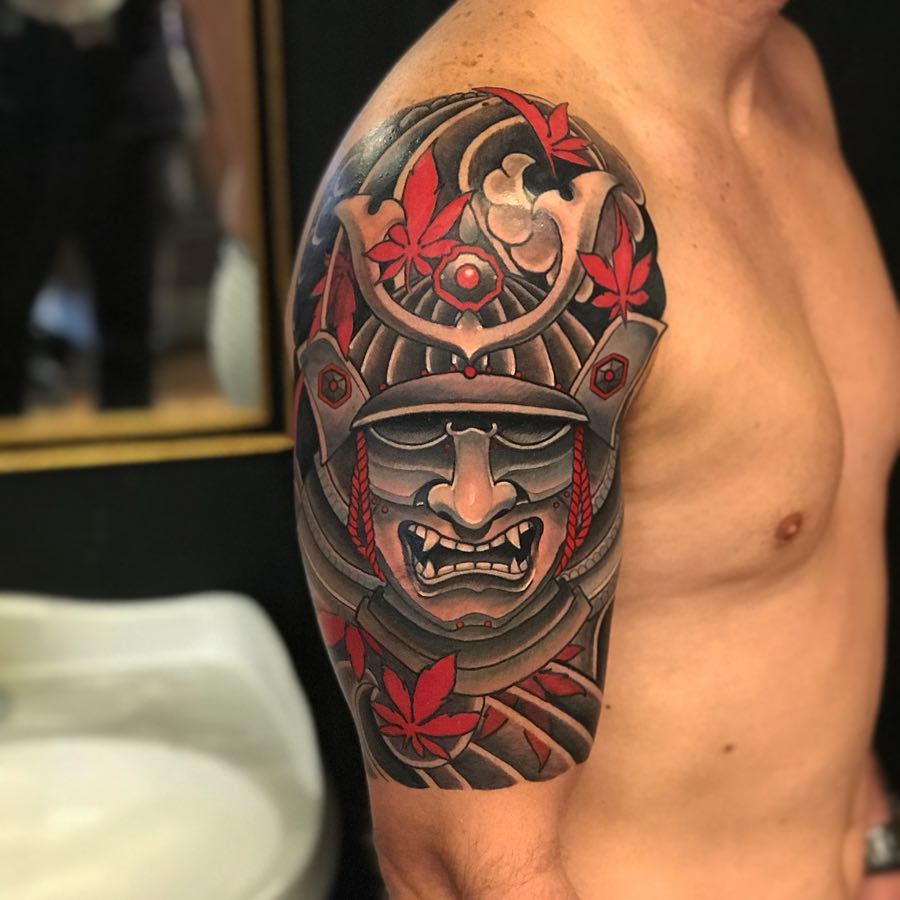
19. Tengu
Tengu are mythical creatures in Japanese folklore, often depicted as bird-like beings or fierce warriors. They are known for their martial prowess, spiritual wisdom, and mischief, often representing both the positive and negative aspects of power. In tattoos, tengu can symbolize strength, protection, and the balance between chaos and order. The design typically features a human-like figure with wings, a long nose, and fierce expressions. Tengu tattoos can be bold and dynamic, representing the wearer’s connection to spiritual power or their ability to navigate life’s challenges with wisdom and strength.
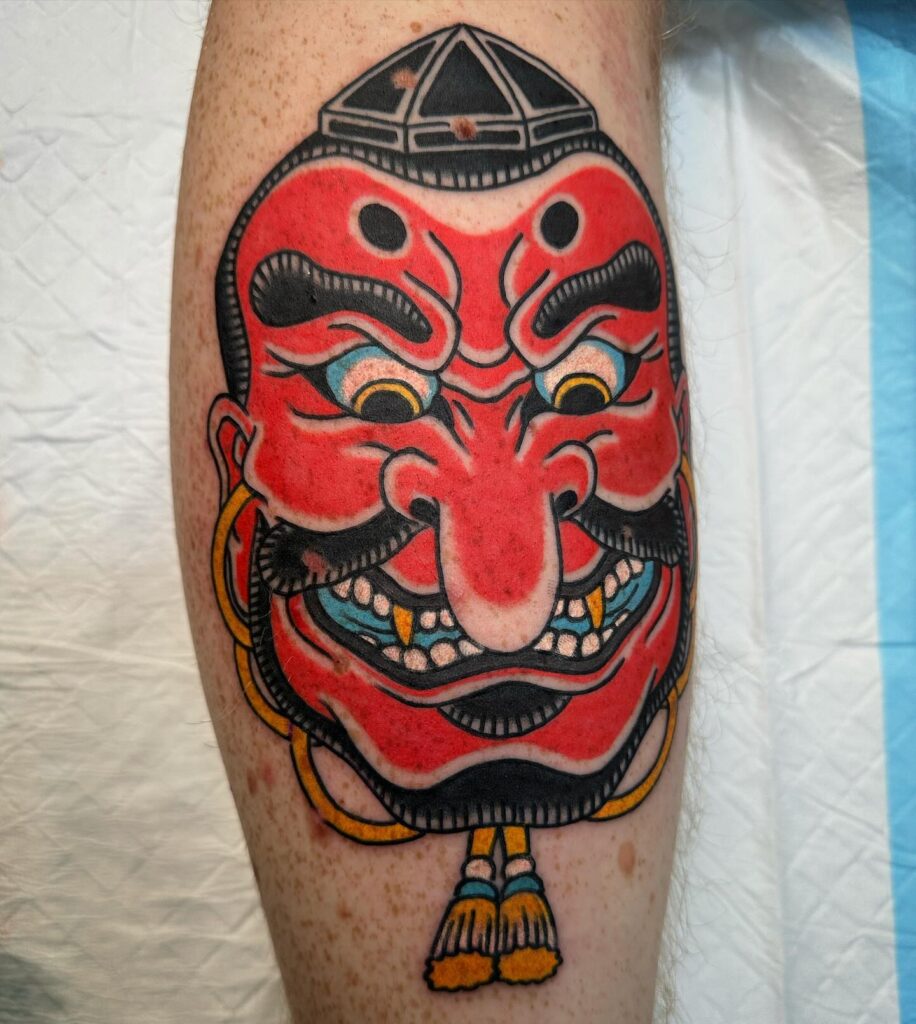
20. Water Dragon
A water dragon tattoo combines the symbolism of the dragon with the element of water, representing both strength and adaptability. In Japanese mythology, water dragons are seen as protectors of seas, rivers, and rainfall, symbolizing the natural flow of life and the power to overcome adversity. These tattoos often feature a dragon in motion, surrounded by waves or water splashes, emphasizing the dynamic and fluid nature of the design. A water dragon tattoo is ideal for those who wish to convey their inner strength, resilience, and connection to nature’s powerful forces.
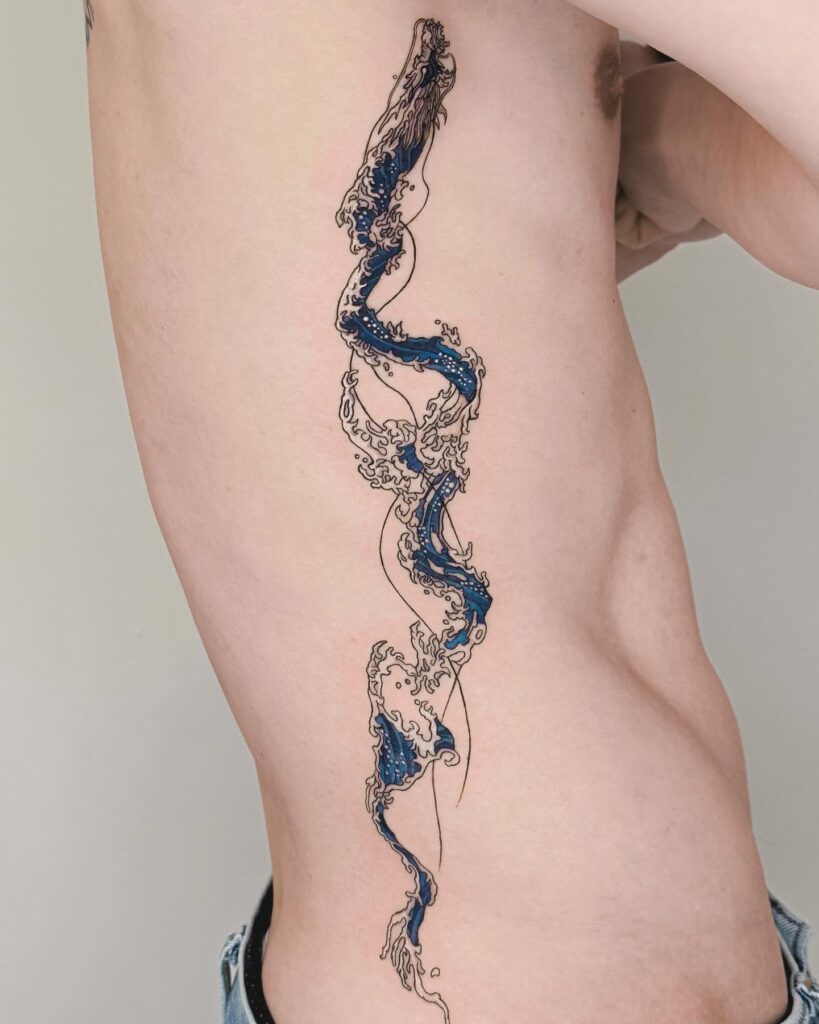
21. Cherry Blossom Branch
A cherry blossom branch tattoo represents life, renewal, and the fleeting beauty of nature. Unlike individual cherry blossom flowers, the branch symbolizes the cycle of life, as the flowers bloom and fall away with the changing seasons. This design can be more expansive, covering areas like the back or arm, with branches extending and blossoms in various stages of bloom. The tattoo can symbolize the passage of time and the beauty found in each moment. A cherry blossom branch tattoo is ideal for those seeking to celebrate life’s ephemeral beauty and personal growth.
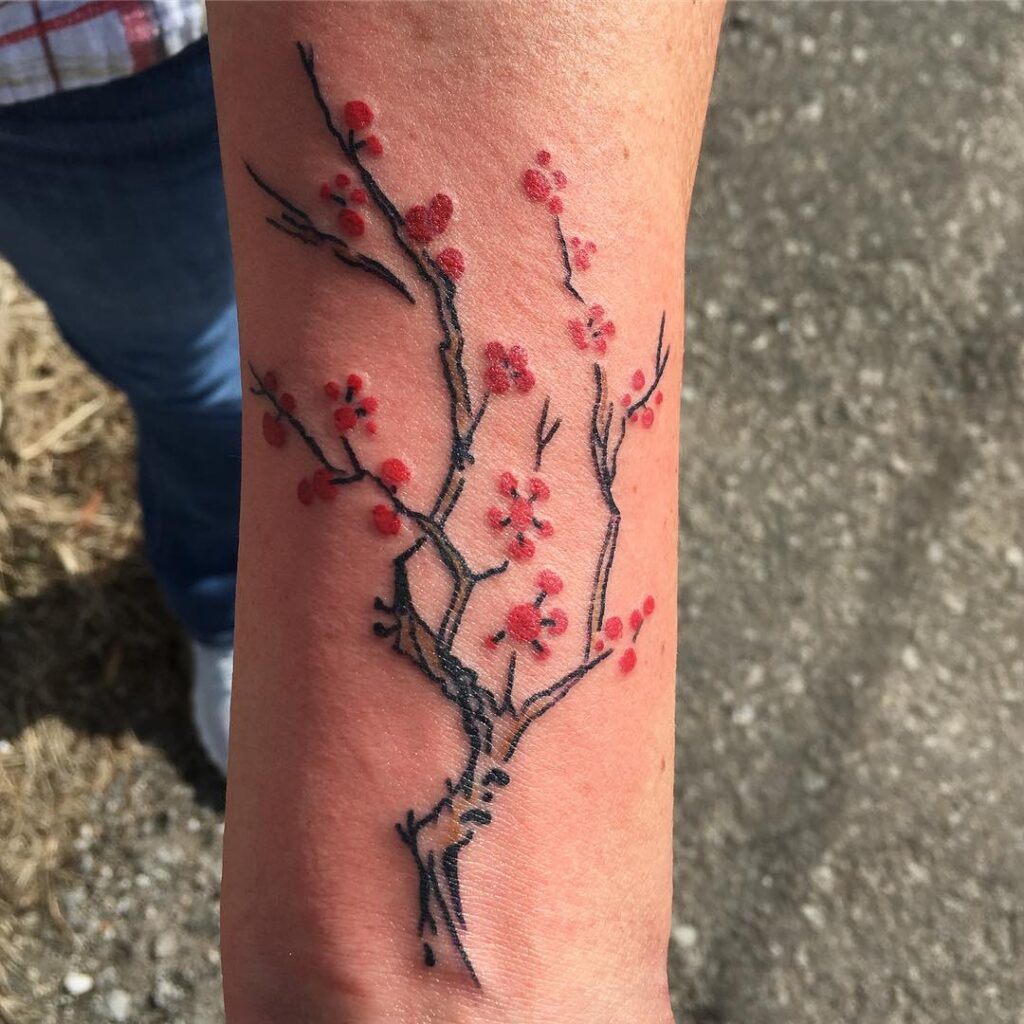
22. Japanese Crane with Flowers
A crane tattoo combined with flowers, such as cherry blossoms or lotuses, creates a harmonious design representing longevity, peace, and purity. The crane is a revered bird in Japan, often symbolizing good fortune and long life, while flowers add elements of beauty and spiritual growth. This tattoo design is delicate and elegant, often featuring the crane in mid-flight with flowing feathers and blossoms scattered around. It’s a perfect choice for individuals seeking to convey balance, harmony, and the desire for a peaceful, prosperous life.
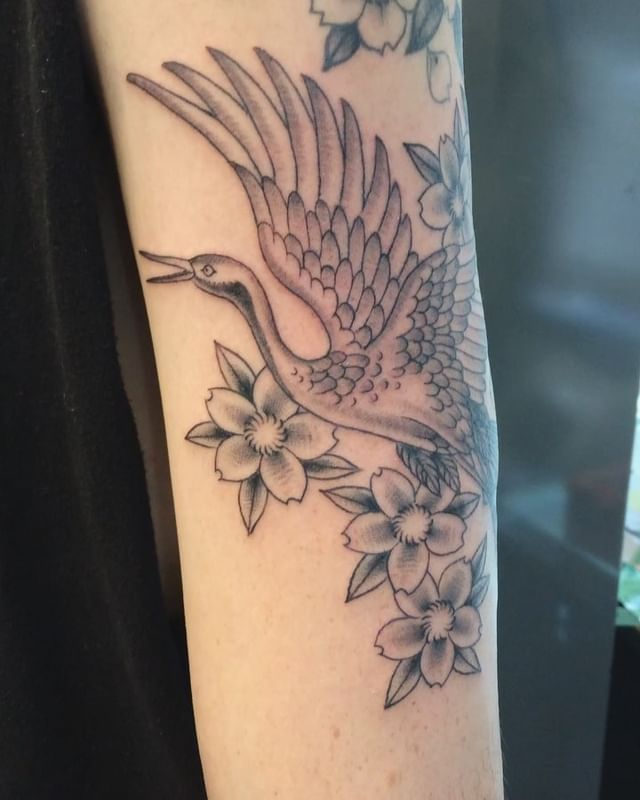
23. Full Body Irezumi
A full-body irezumi tattoo is a traditional Japanese tattoo style that covers large portions of the body, often from the shoulders down to the legs. These tattoos are highly detailed and can feature a combination of traditional elements like koi fish, dragons, waves, cherry blossoms, and samurai. Each element in the design holds its own symbolism, and together they create a cohesive narrative about the wearer’s life, values, and experiences. A full-body irezumi tattoo is a commitment to the art form and represents strength, endurance, and respect for Japanese tattoo traditions.
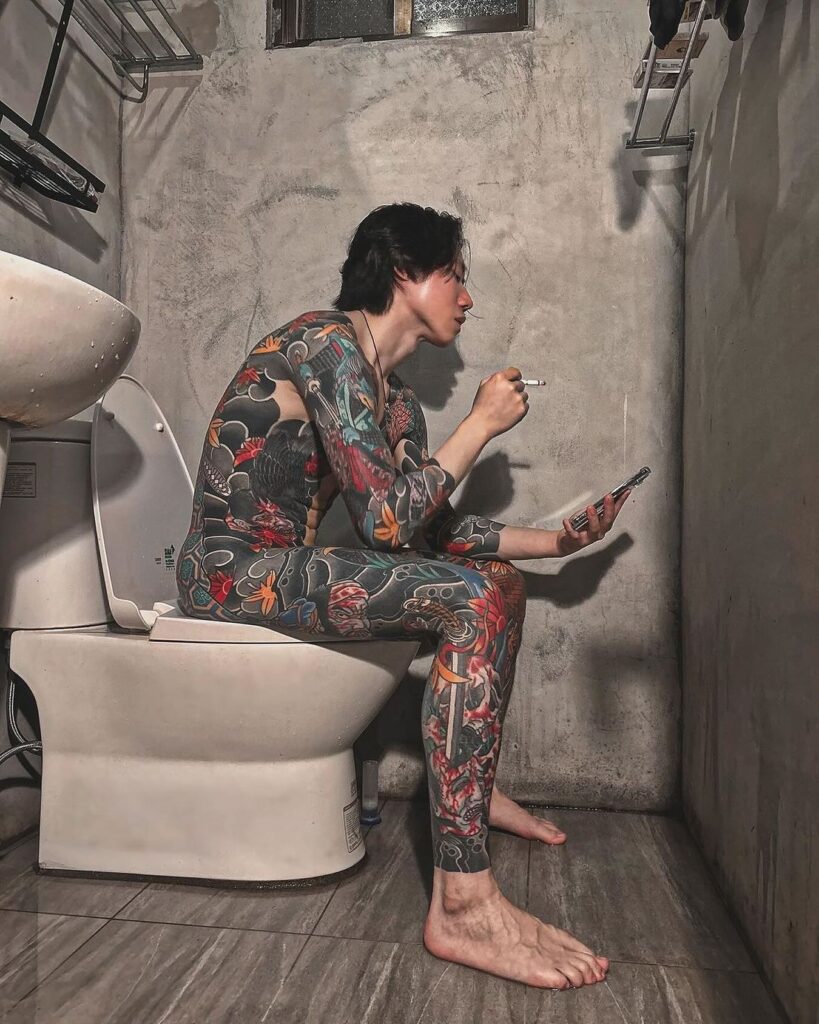
24. Lotus with Koi Fish
A lotus with koi fish tattoo combines two powerful symbols of growth, transformation, and spiritual enlightenment. The koi fish represents perseverance and the ability to overcome obstacles, while the lotus flower symbolizes purity and rising above challenges. Together, they create a design that represents inner strength and personal development. This tattoo is often depicted with the koi fish swimming toward the lotus, symbolizing the journey toward enlightenment. The vibrant colors and intricate details of both the fish and the flower make this tattoo visually striking and rich in meaning.
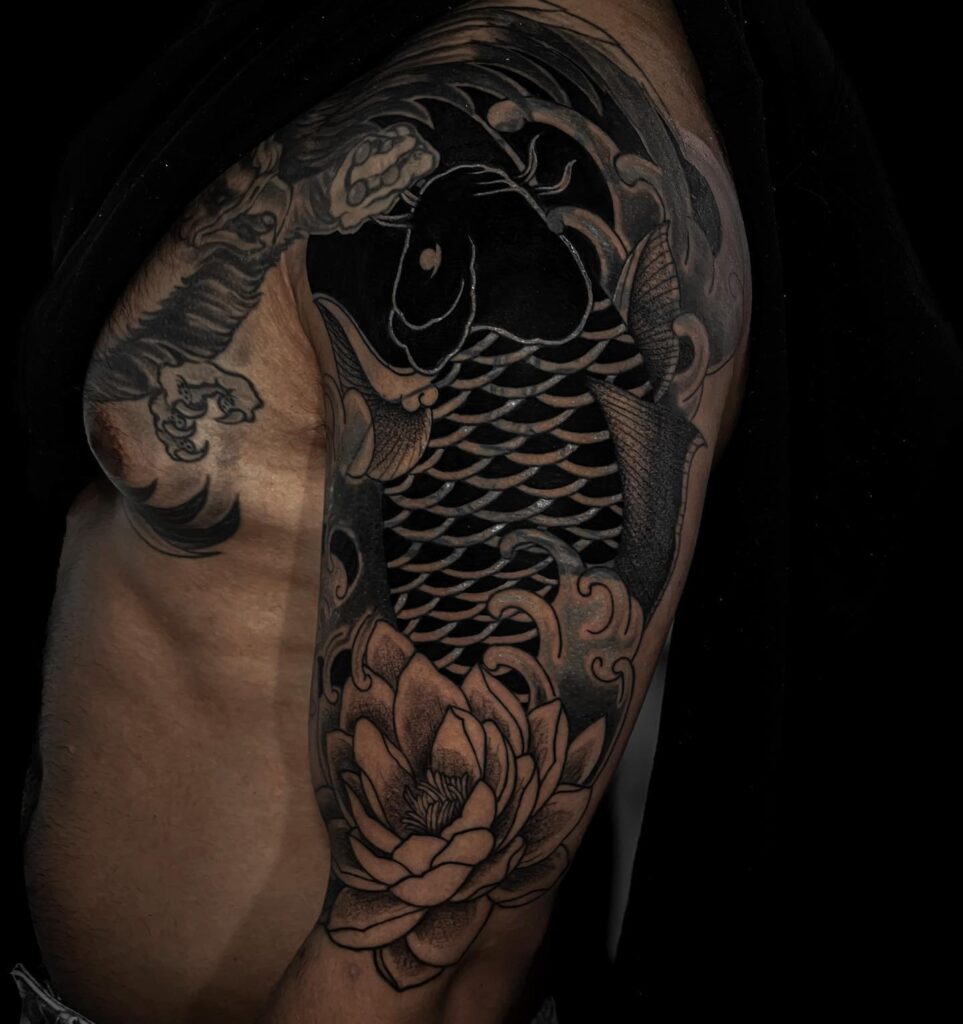
25. Kitsune Mask with Flowers
A kitsune mask tattoo with flowers blends the mysterious and playful nature of the kitsune with the beauty of Japanese floral motifs. The kitsune mask represents transformation and intelligence, while flowers like cherry blossoms or lotuses add a layer of symbolism related to beauty, purity, or the fleeting nature of life. This design is often colorful and stylized, featuring the sharp lines of the kitsune mask contrasted with the soft, flowing petals of the flowers. It’s a popular choice for individuals who appreciate the balance between playfulness and wisdom, combined with an appreciation for nature’s beauty.
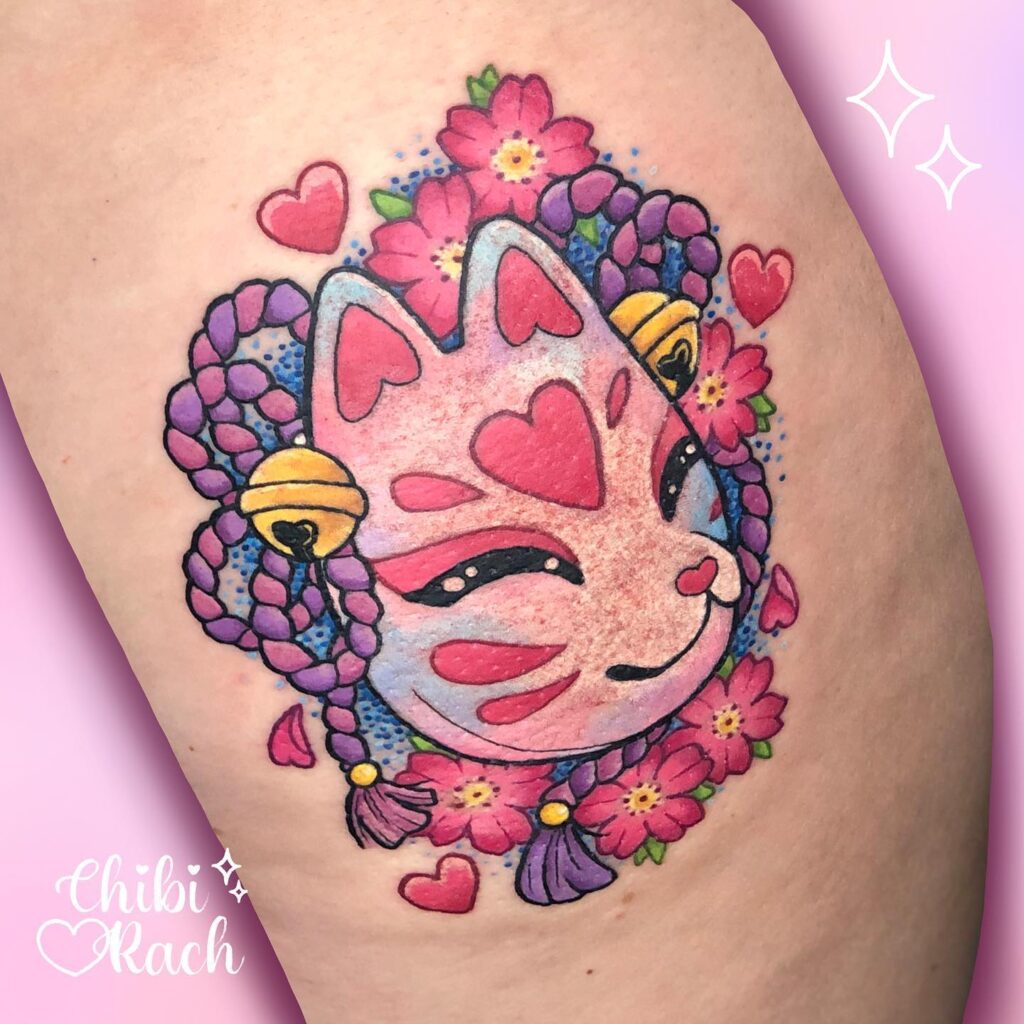
26. Warrior Monk (Sohei)
A warrior monk tattoo, or sohei, represents both spiritual devotion and martial strength. In Japanese history, sohei were monks who practiced both religion and martial arts, making them a symbol of discipline, balance, and resilience. These tattoos often feature the monk in traditional robes, holding a staff or sword, and are designed with a sense of calm yet powerful energy. The sohei tattoo is ideal for individuals who seek to balance inner peace with outer strength, embodying the idea that spiritual devotion and personal power can coexist in harmony.
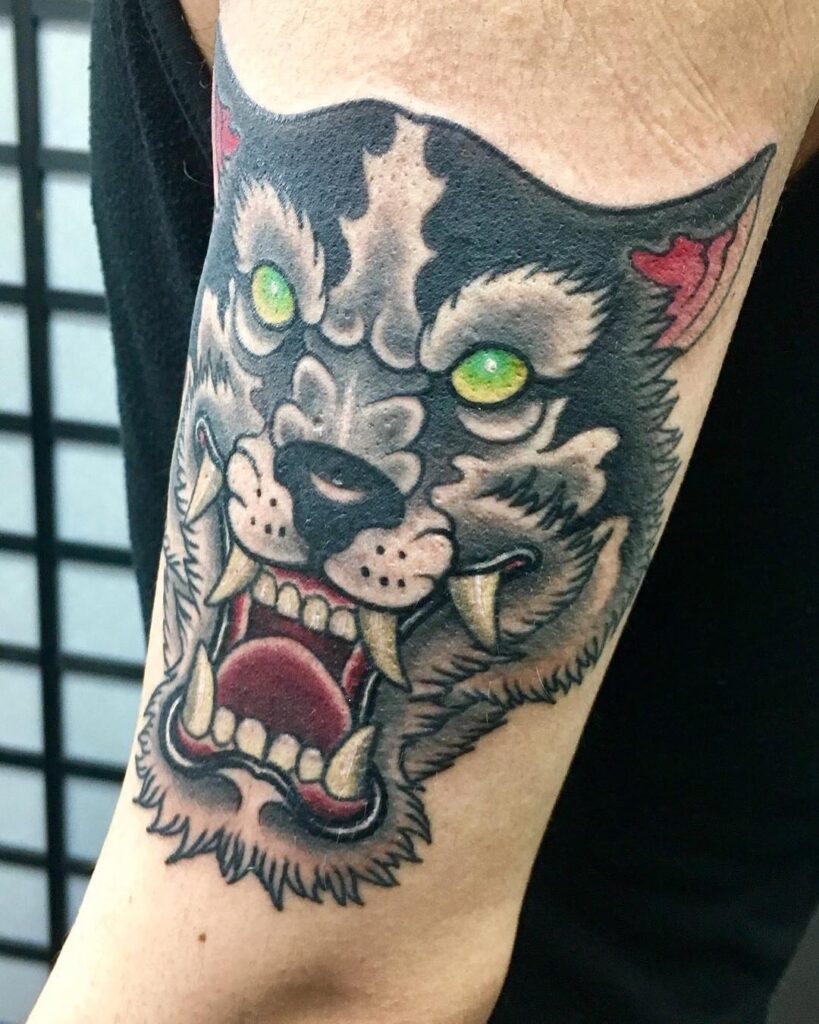
27. Japanese Maple Leaves (Momiji)
Japanese maple leaves, or momiji, are a symbol of beauty, change, and the passage of time. In tattoos, the vibrant red and orange leaves represent autumn and the idea that life is in constant transition. The delicate nature of the maple leaf contrasts with its bold colors, making it a perfect tattoo design for those who appreciate life’s fleeting moments and the beauty found in change. This tattoo can be designed with individual leaves or as part of a larger scene featuring trees or other natural elements, creating a dynamic and meaningful piece.
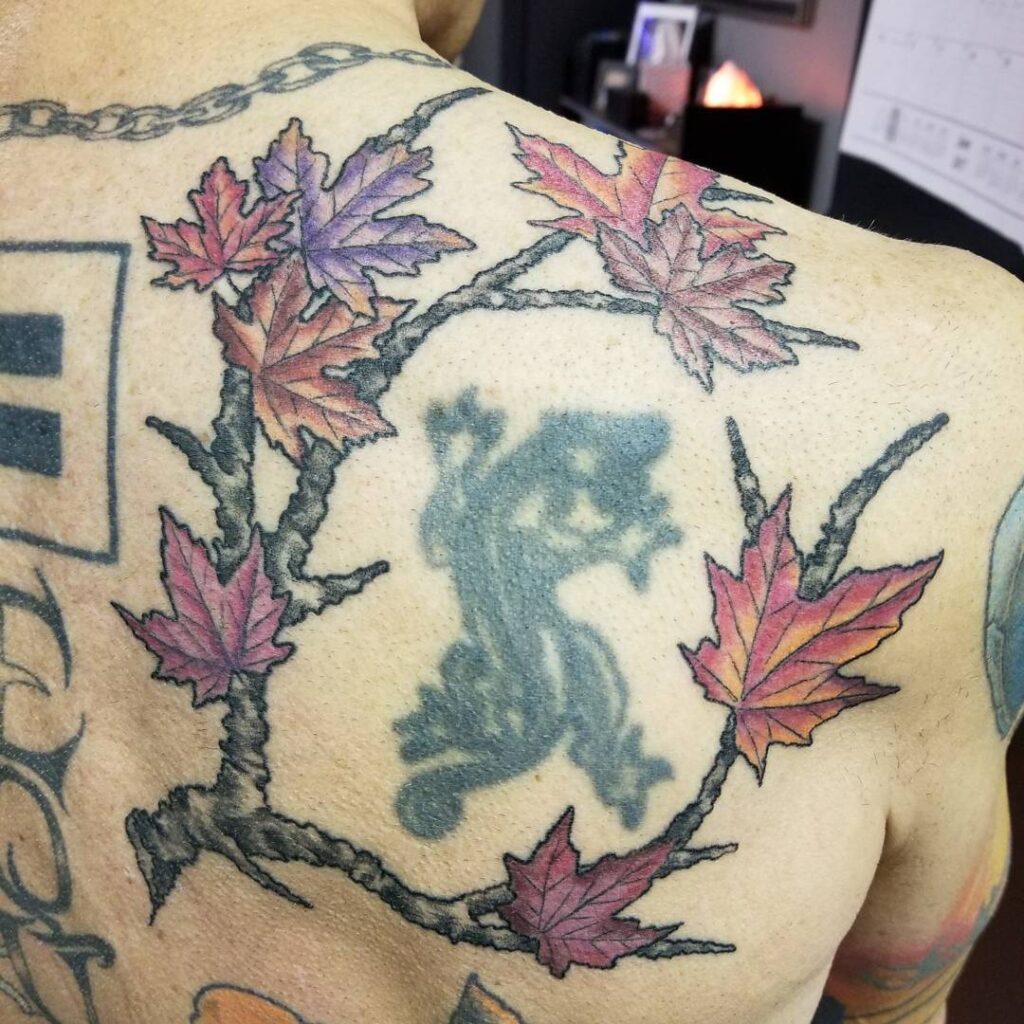
28. Wind Barriers (Fu-Jin)
Fu-Jin is the Japanese god of wind, often depicted as a muscular figure carrying a large bag of wind on his shoulders. A Fu-Jin tattoo represents the uncontrollable forces of nature and the power of the wind. It symbolizes freedom, unpredictability, and strength. Fu-Jin tattoos often feature swirling winds and clouds, creating a sense of movement and power within the design. This tattoo is perfect for individuals who feel a strong connection to nature’s elements and wish to express their inner strength, unpredictability, or desire for freedom.
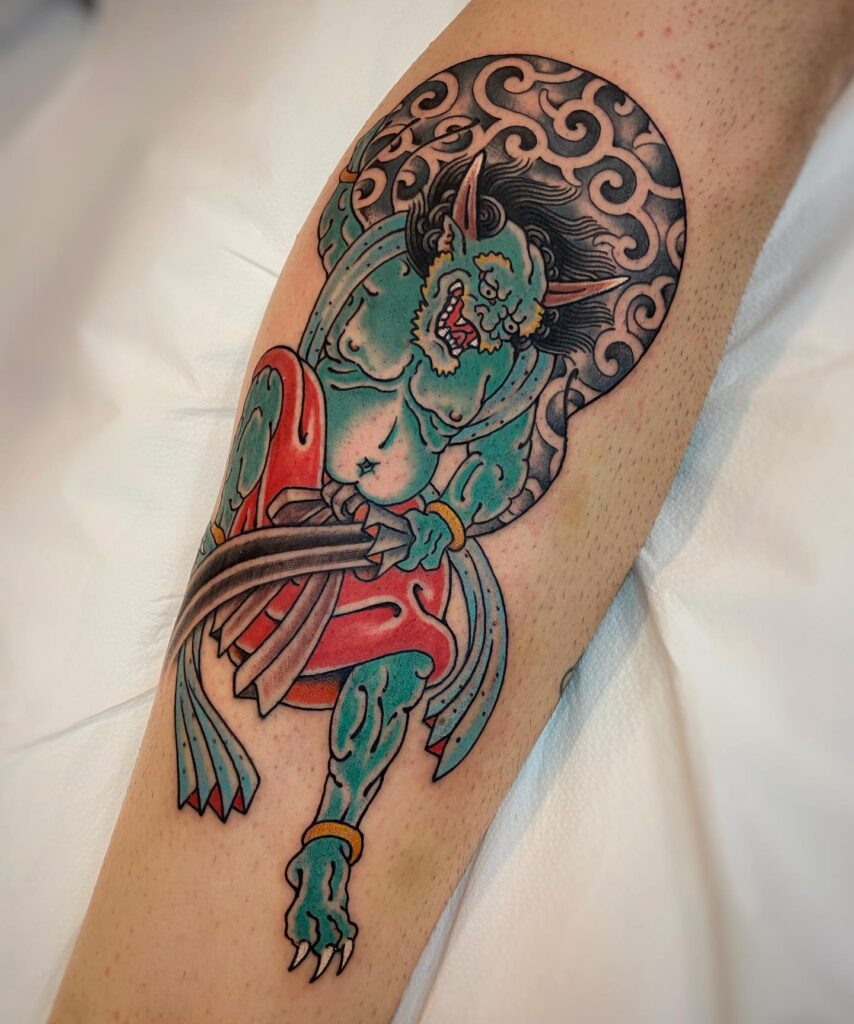
29. Bamboo
Bamboo symbolizes strength, flexibility, and longevity in Japanese culture, making it a popular tattoo choice for those who value resilience and the ability to adapt to life’s challenges. Bamboo grows quickly and bends without breaking, representing the idea of staying strong through adversity. Bamboo tattoos often feature tall, slender stalks with leaves, designed in a minimalist or detailed style. They can be combined with other elements like cranes, koi fish, or waves to enhance the symbolism. This tattoo is ideal for those seeking a reminder of their inner strength and ability to grow through life’s difficulties.
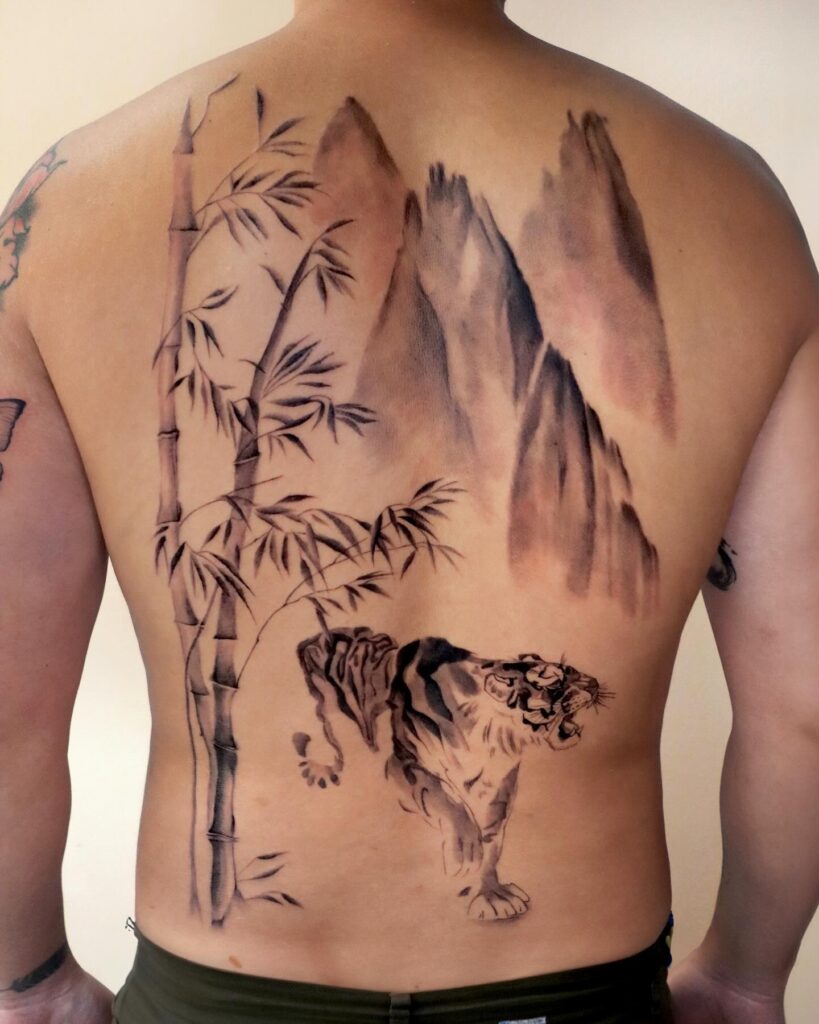
30. Japanese Fan (Sensu)
The Japanese fan, or sensu, is a symbol of grace, elegance, and cultural tradition. In tattoos, the fan represents beauty and the art of concealment or mystery, as it was traditionally used in dance and performance. Sensu tattoos often feature intricate patterns, floral designs, or symbols of good fortune, making them both decorative and meaningful. The fan can be depicted open, revealing a beautiful scene, or closed, symbolizing hidden beauty or potential. This tattoo is perfect for individuals who appreciate Japanese cultural artistry and wish to express their connection to grace and elegance in life.
